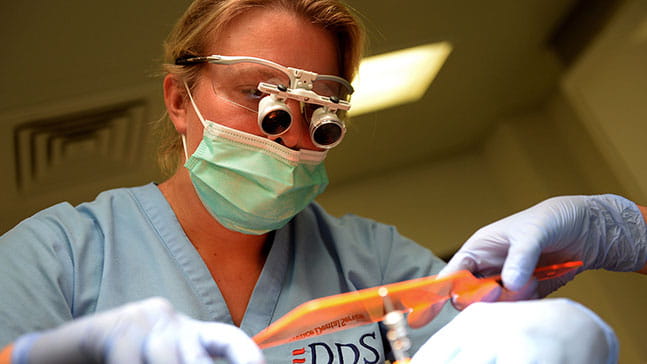Dental Officer Cadet
The Royal Navy will pay your tuition fees and an annual salary for the final 3 years of your Dental School Training. Once qualified, you'll lead a dental team in providing world class dental care to our personnel all around the world.
- £17,000 - £150,000
- Undergraduate Degree
- Surface Fleet
- Medical
- Officer level
£17,000
Earn at least this amount once you start your cadetship
£66,900
Financial support
6 weeks
Free
Travel

I thought qualifying as a Dentist was the hardest thing I’d ever do, but I was wrong. Since I joined the Royal Navy I’ve been challenged more than I imagined possible – it’s been really rewarding.
Role details
What you’ll do
Your journey will start at university, where you can apply to finish your studies in the Royal Navy, earning a salary and having up to the final three years’ fees paid for by us (not including any intercalation year). You'll be part of a University Royal Naval Unit during your studies and form a social and support network.
And after that, you’ll be on course for a dental career like no other.
You can work in shore establishments and provide dental care for Service personnel on deployments and exercises across the globe.
In return, you’ll be part of a world-class medical service that’s respected far beyond the Armed Forces. The very nature of life in the Royal Navy means we need dentists of the highest calibre.
Your role
- Once you’ve qualified, you’ll work on large warships, including our Queen Elizabeth Class Aircraft Carriers, where you’ll have a fully-fitted dental surgery and access to the sick bay’s operating theatre and ward facilities. On smaller ships, you’ll manage the portable dental unit that travels with you.
- Later in your career you could have the opportunity to complete specialist training in areas such as periodontics or endodontics. You’ll also develop your management and leadership skills through our world-class courses and mentoring schemes.
- Even the smallest dental problem can have a serious effect on the morale of a crew member and the effectiveness of the wider ship’s company. You’ll work with your team to complete preventative dentistry and deal with a full range of clinical problems, in some of the most challenging conditions imaginable.
- Outside your practice, you’ll have a vital operational role to play. You could find yourself in a combat or disaster zone, where you’ll need to put flight-deck control, firefighting and advanced life support training to use.
Pay & benefits
- Up to the final three years’ academic fees paid for
- Start on a cadetship salary of at least £19,000
- On completion of your Foundation Dental Year your salary will start from £75,648
- Additional pay for every day spent at sea
- Postgraduate development fully encouraged
- An excellent pension scheme
- Six weeks of paid holiday every year
Skills for life
Qualifications you'll gain
- Foundation dental training
- Opportunity to complete further post-graduate level study
Skills you'll develop
- After completing Foundation Dental Training, you may be given the opportunity to further your skills in areas such as restorative and endodontics and complete further Masters level study.
- Training will be a constant feature of your time with us. We’ll help you earn academic qualifications and gain specialist skills. As well as helping you develop your Royal Navy Career, everything you achieve will be recognised and valued by a future civilian employer.
Eligibility
- You must be aged between 18 and 54
- 5 grades A*-C (9-4) Including grade 6 (B) or above in English Language and Maths
-
Cadetships are available for your final three years at a UK dental school (not including your intercalation year)
- A National of the United Kingdom or Dual National - Dual Nationality restrictions apply
- A Body Mass Index (BMI) between 18 and 28 (between 17 and 27 if under 18)
- Pass the Naval Swimming Test
We are now only taking applications for Dental Students who will be graduating in 2027 or later.
Skills & Interests
- Ambitious and passionate about dentistry
- A confident leader
- Always calm under pressure
- Have a spirit of adventure
Joining Process
From picking your role to the first day of training; everything you need to know as an officer
Submit an application
Once you’ve registered your interest and have satisfied the basic eligibility criteria, you will be sent an online application form. Your recruiter will then check for cadetship availability prior to proceeding
NB: Applications should be submitted in the first year of university and the full application process must be completed in time for the Cadetship Selection Board which takes place towards the end of the second year of university.
Defence Aptitude Assessment (DAA)
You’ll be tested on: Verbal Reasoning, Numerical Reasoning, Work Rate, Spatial Reasoning, Electrical Comprehension and Mechanical Comprehension.
To prepare, you can practise the DAA
Interview
Medical and eye tests
Pre-Joining Fitness Test (PJFT)
Admiralty Interview Board (AIB)
Dental Officer Cadet Selection Board
Career Progression
Got a question?
Our virtual recruiter is available to answer your questions 24 hours a day
